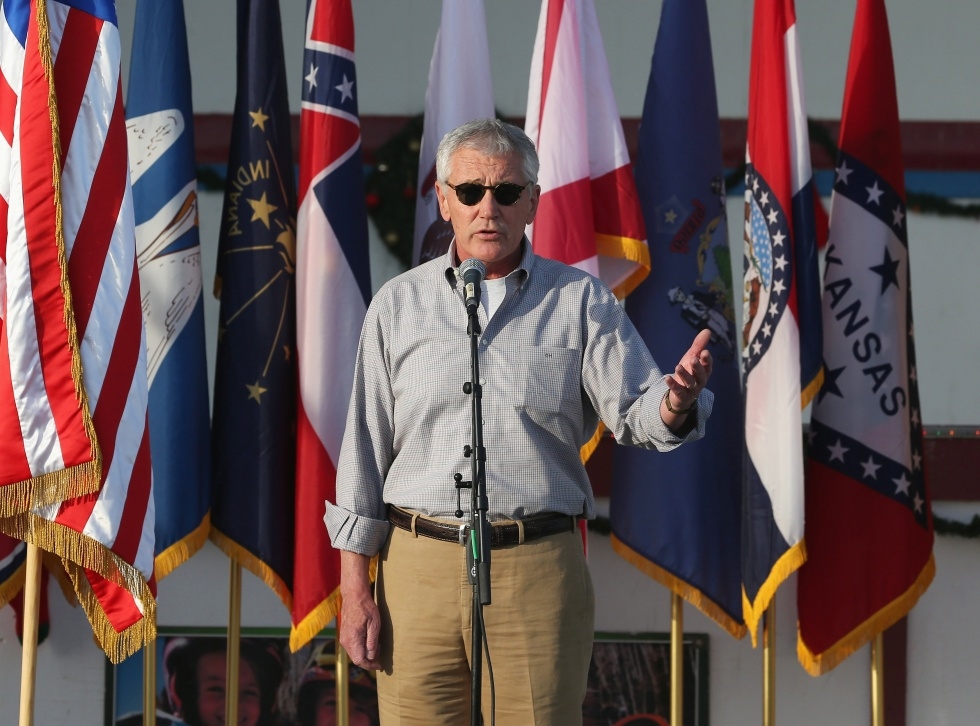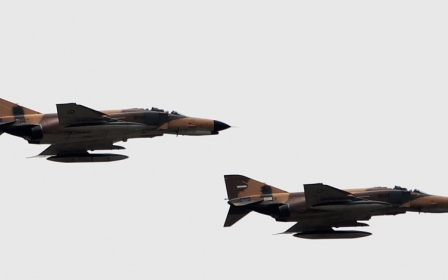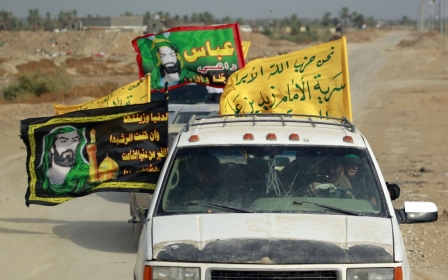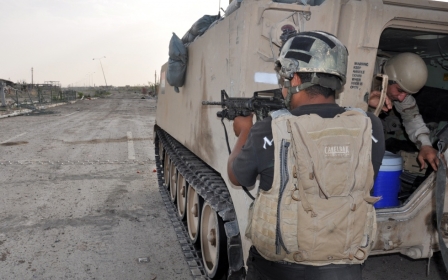US defence chief in Baghdad for anti-IS push as Abadi urges more arms for Iraq's army

US Defence Secretary Chuck Hagel visited Iraq's Prime Minister Tuesday to review efforts against the Islamic State (IS) group and insisted it was up to Iraqis themselves to win the war against the militants.
Meeting Hagel in Baghdad, Iraqi Prime Minister Haider al-Abadi said that his forces were advancing on the ground against IS fighters, who have seized large parts of the country.
"But they need more air power and more...heavy weaponry. We need that," Abadi told Hagel, the outgoing US defence secretary who was on his first -- and probably his last -- visit to the Iraqi capital as Pentagon chief.
Abadi's request highlighted a disagreement over war strategy between Baghdad and Washington, with the Americans favouring a more limited air campaign until Iraqi forces are ready to hold on to territory and organise major offensives.
"The focus of our conversations today was the effort to degrade and defeat ISIL (IS), and as I discussed with Iraqi leaders, we are seeing steady progress in achieving this objective," Hagel said.
He said he appreciated Abadi's "directness" in requesting more firepower and added: "We talked about how in fact... the US has accelerated weapons systems that Iraq will need" such as Hellfire air-to-surface missiles and other arms and ammunition.
But Hagel, speaking to a group of US and Australian troops, said the outcome of the campaign would ultimately hinge on the Baghdad government.
Washington has forged an alliance of Western and Arab countries that has launched air strikes against IS after the group seized swathes of territory in Iraq and Syria and declared an Islamic "caliphate".
The United States will be doubling the number of its troops in Iraq helping government forces to 3,100, and on Monday the American commander of the war effort said allies were also ready to send roughly 1,500 security personnel.
But, speaking to a group of US and Australian troops soon after he landed, Hagel said the outcome of the campaign would ultimately depend on the Baghdad government.
"It's their country, they have to lead, they're the ones who are going to have to be responsible for end results," he said.
"We can help, we can train, we can assist, we can advise -- we're doing that."
Need an Iraqi inclusive government
The Iraqi leadership will need to build an inclusive government that wins the trust of all the country's religious and ethnic communities, he said.
Support for IS has been in part fuelled by complaints from Iraq's Sunni community of being excluded from power by the country's Shiite-led government.
US and allied warplanes have launched more than 1,200 air strikes against IS in Iraq and Syria since August 8.
Hagel arrived in Iraq from Kuwait, where US Lieutenant General James Terry, who oversees the war against IS, said Iraqi security forces were steadily improving but remained months away from staging large-scale offensives that could roll back the militants.
"While they still have a long way to go I think they're becoming more capable every day," he said.
He said that the daily air strikes had limited the fighters' mobility and disrupted sanctuaries in Syria.
The militants are "on the defence, trying to hold what they had gained but still able to conduct some limited attacks out there."
The general's remarks echoed comments earlier in Kuwait by Hagel, who said Iraqi government troops were increasingly taking the fight to IS.
Air power and other support from the US-led coalition "has in effect allowed the Iraqi security forces to take back some ground," Hagel said during a visit to a US base in Kuwait.
"It's given them some new momentum, organisation, structure."
Regional response to IS
Iranian President Hassan Rouhani called Tuesday for a regional response to the threat posed by IS in Iraq and Syria rather than the deployment of troops from further afield.
"If countries in the region agree, they could eliminate anti-Islamic groups like Daesh and liberate thousands of men, women and children who have lost their homes," Rouhani told an anti-extremism conference in Tehran, using the Arabic acronym for IS.
"In this case, there would be no need for the presence of foreigners," he added.
Iran is a key ally of Syrian President Bashar al-Assad and has said it supports the Iraqi government in its fight against IS.
Rouhani called for countries to "stop direct and indirect financial aid to terrorist groups" -- something Iran has frequently declared Qatar and Saudi Arabia guilty of.
He also called for a change in teaching at religious learning centres to prevent young people being radicalised and for the international community to fight "the use of the Internet and social networks by terrorists".
New MEE newsletter: Jerusalem Dispatch
Sign up to get the latest insights and analysis on Israel-Palestine, alongside Turkey Unpacked and other MEE newsletters
Middle East Eye delivers independent and unrivalled coverage and analysis of the Middle East, North Africa and beyond. To learn more about republishing this content and the associated fees, please fill out this form. More about MEE can be found here.




